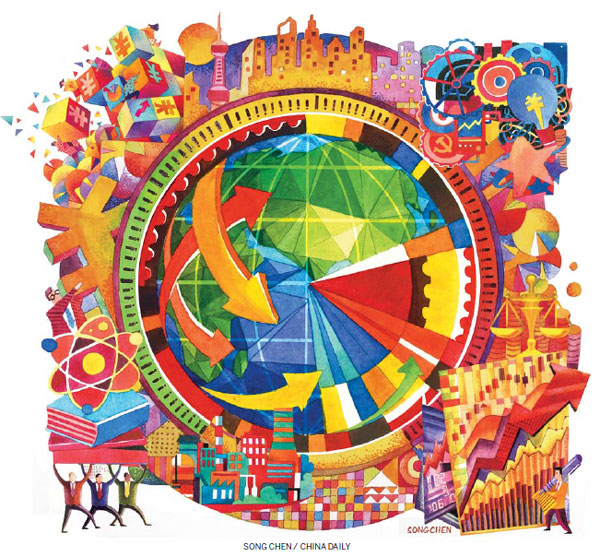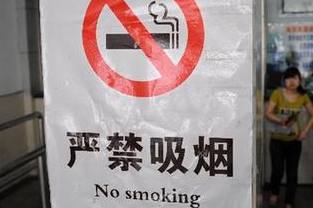President's vision inspires new vigor

Xi wins nation over with his philosophy and confidence
More than four years after he promised a great renewal of the Chinese nation - while ensuring that the country stands tall in the world and the Communist Party of China conducts its affairs with strict discipline - President Xi Jinping's insights into the country's political and economic development are revitalizing the national modernization drive.
When Xi appeared in front of the media at the Great Hall of the People in Beijing on Nov 15, 2012, following his election as the Party's top leader, his confident demeanor and admission of challenges, such as corruption within the Party, pointed to changes ahead.
"We are not complacent, and we will never rest on our laurels," he told the nation in a televised address, after praising past achievements.

More than 1,500 days into his leadership, Xi has successfully imbued the country's political and economic governance with his own thinking.
Xi, general secretary of the CPC Central Committee and chairman of the Central Military Commission, spearheaded a popular anti-corruption drive that has exposed a long list of fraudulent officials, from low-ranking "flies" to high-ranking "tigers".
Last year, a report in The Wall Street Journal said that during the campaign, which has netted more than 1 million officials since late 2012, Xi has called for greater checks on political power, creating a "cage of regulations" that ensures cadres "dare not, cannot and do not want to" be corrupt.
He has also publicly defended free trade against a backdrop of weak growth momentum in major economies and rising trade protectionism, and managed to sustain the world's second-largest economy on the track of fast growth.
Last year, China's GDP grew by 6.7 percent to 74.4 trillion yuan ($10.8 trillion; 10.2 trillion euros; 8.8 trillion), making the country the fastest-growing major economy in the world.
Xi has also taken a quantum leap in leading China's participation in global governance, guiding the ancient civilization back to the center of the world stage.
"By 2016, a broad swath of Americans had begun to feel the effects of China's development in their everyday lives - in shopping malls, at the multiplex, in paychecks - and to sense that the center of global power might be shifting from the United States toward China," Robert Daly, director of the Kissinger Institute on China and the United States, wrote earlier this year.
Later, in the magazine Foreign Policy, he wrote: "In 2016, China's big plans may have begun to tilt the balance."
Liu Shangxi, director of the Chinese Academy of Fiscal Sciences, said the advent of the new century saw human civilization usher in a new era distinguished by the declining efficiency of Western countries in terms of economics, society and systems.
"Conversely, emerging countries such as China, with their growing influence, are eager to find an independent path of sustainable development," he said.
Although China's development comes during a period of strategic opportunity, the national economy is facing complex external and internal environments.
Externally, people are concerned about sluggish recovery, a lack of growth momentum, weak trade and investment, and a backlash against globalization.
In the aftermath of the 2008 financial crisis, the global political and economic order, as well as Western social and economic development models, fell short in formulating a viable solution to the crisis. As a result, the problems have still not been fundamentally resolved.
Internally, China's decades-long reform drive is at a crossroads amid the pressing need for a transition in the country's growth model.
Globally, policymakers and researchers in both developed and developing countries are beginning to search for new governance concepts and theories in the hope of building a new international political and economic order, as well as new models of economic and social development.
To that end, China has put forward two centenary goals, pegged to the 100th anniversaries of the CPC and the People's Republic of China, and the Chinese dream of great national renewal.
Liu believes the two goals and the Chinese dream not only embody the demands the Chinese people place on the ruling party, but have also started the nation on a voyage to search for a new path for mankind.
During the past four years, a number of developmental approaches have been devised, including the concept of innovative, coordinated, green, open and shared development, the market's decisive role in resource allocation, the new normal and supply-side structural reform.
These theories, which suit both China and the times, have created gateways to realizing the Chinese dream of rejuvenation, he added.
With its mastery of advanced theories, the CPC Central Committee has outlined a strategic blueprint called the "Four Comprehensives", which refers to comprehensively building a moderately prosperous society, comprehensively deepening reform, comprehensively advancing the rule of law and comprehensively governing the Party strictly.
In 2013, the third plenary session of the 18th CPC Central Committee featured a comprehensive reform package covering 60 tasks and more than 300 reform measures. The Central Leading Group for Deepening Overall Reform has held 32 meetings in the last three years to chart the framework for further reforms.
The blueprint for rule of law, set by the fourth plenary session in 2014, has put forward the fundamental tasks and a pathway to fully advance the rule of law.
In 2015, the fifth plenary session adopted the 13th Five-Year Plan (2016-20), mapping out measures to achieve the goal of building a moderately prosperous society in all respects and putting forward the five new development concepts.
Hu Angang, from Tsinghua University, believes that the measures initiated by the plan will lay the groundwork for the nation's goal of becoming a modern socialist country that is prosperous, strong, democratic, culturally advanced and harmonious in time to mark the centenary of the People's Republic of China in 2049.
Last year, at the sixth plenary session of the 18th CPC Central Committee, two documents related to Party discipline, including the norms of political life within the Party under the new conditions and a regulation on intra-Party supervision, were approved.
Since the 18th CPC National Congress in 2012, the progress made in the Party's fight against corruption has won the confidence of Party members and the public.
By netting both "tigers" and "flies," pushing forward reforms with the anti-graft system and seeking international cooperation, the fight against corruption has gained "crushing momentum".
Between 2013 and September, disciplinary inspection agencies at all levels investigated more than 1 million suspected violations and about 1 million CPC members were punished for violating the rules.
The four plenary sessions of the 18th CPC Central Committee opened a new chapter and drew up a new blueprint for the country's comprehensive development, revealing China's effectiveness and strong will in governance, according to Hu, of Tsinghua University.
He noted that China is now playing a bigger role in the global governance system and promoting international relations and cooperation.
The ongoing efforts include devising a new mode of relations between China and the United States, implementing the Belt and Road Initiative to link Europe, Asia and Africa, an emphasis on neighborhood diplomacy and vigorous participation in global governance.
Through the APEC Beijing summit in 2014, the UN Sustainable Development Summit in 2015 and the G20 Hangzhou summit in September, Xi has played a responsible and irreplaceable role in the relevant fields.
China's overall approach to building socialism with Chinese characteristics - that is, the promotion of coordinated economic, political, cultural, social and ecological progress - has been proved effective during the past four years.
The global economy is troubled by sluggish recovery, flagging international trade, a measure of backsliding on globalization and weak growth momentum in major economies.
By contrast, China's economic growth, although slowing, is still one of the highest in the world and continues to power global growth.
By 2020, China aims to quadruple its GDP from the level in 2000. Last year, in terms of stable prices, GDP was more than four times higher than in 2000, meaning the country met the 2020 goal ahead of schedule, Hu said.
Chen Dongqi, an economist with the Academy of Macroeconomic Research at the National Development and Reform Commission, said: "It's important that this was achieved through China's voluntary structural adjustment and forceful promotion of supply-side structural reform, meaning it is of higher quality."
He estimated that China will be home to about 440 million middle-class households once the country realizes its goal of building a moderately prosperous society in all respects by 2020.
The country has also built the world's largest modern public cultural system. In 2015, broadcasting and TV programs covered more than 98 percent of the population, while public libraries, cultural centers and museums received nearly 2 billion visitors.
Quality of life has also improved markedly, with the average per capita growth rate of incomes for urban and rural residents standing at 7.7 and 9.6 percent respectively between 2011 and 2015.
Meanwhile, average life expectancy reached 76.34 years in 2015, compared with 74.83 years in 2010.
In a major ecological achievement, China is gradually decoupling its economic growth from heavy consumption of resources and the subsequent pollution.
In 2015, industrial water consumption fell by 7.8 percent from the figure in 2010, while agricultural water consumption was 1.8 percent lower than during the peak year of 2013.
(China Daily Africa Weekly 03/03/2017 page14)
Today's Top News
- The farmer, the snake and Japan's memory hole
- Crossing a milestone in the journey called Sinology
- China-Russia media forum held in Beijing
- Where mobility will drive China and the West
- HK community strongly supports Lai's conviction
- Japan paying high price for PM's rhetoric






























